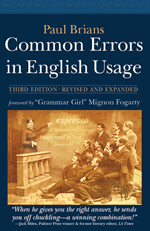Using the plural pronoun to refer to a single person of unspecified gender is an old and honorable pattern in English, not a newfangled bit of degeneracy or a politically correct plot to avoid sexism (though it often serves the latter purpose). People who insist that “Everyone has brought his own lunch” is the only correct form do not reflect the usage of centuries of fine writers.
A good general rule is that only when the singular noun does not specify an individual can it be replaced plausibly with a plural pronoun: “Everybody” is a good example. We know that “everybody” is singular because we say “everybody is here,” not “everybody are here”; yet we tend to think of “everybody” as a group of individuals, so we usually say “everybody brought their own grievances to the bargaining table.” “Anybody” is treated similarly.
However, in many written sentences the use of singular “their” and “they” creates an irritating clash even when it passes unnoticed in speech. It is wise to shun this popular pattern in formal writing. Often expressions can be pluralized to make the “they” or “their” indisputably proper: “All of them have brought their own lunches.” “People” can often be substituted for “each.”
Americans seldom avail themselves of the otherwise very handy British “one” to avoid specifying gender because it sounds to our ears rather pretentious: “One’s hound should retrieve only one’s own grouse.” If you decide to try “one,” don’t switch to “they” in mid-sentence: “One has to be careful about how they speak” sounds absurd because the word “one” so emphatically calls attention to its singleness. The British also quite sensibly treat collective bodies like governmental units and corporations as plural (“Parliament have approved their agenda”) whereas Americans insist on treating them as singular.
See also Collective Plural.
BUY THE BOOK!
